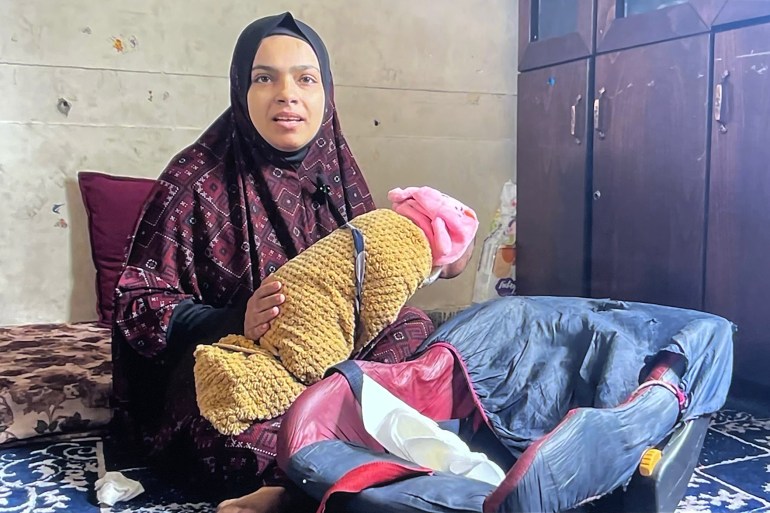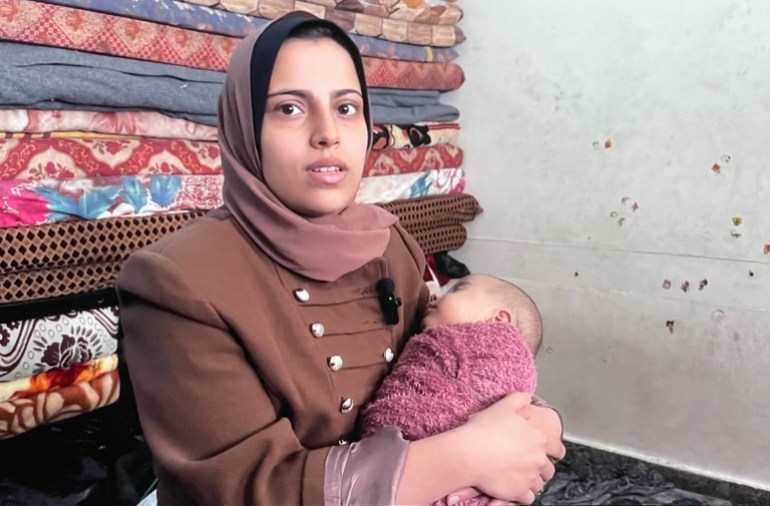Jabalia, Gaza Strip – In Jabalia, the enjoyment of welcoming a new child is marred, to say the least.
Marred by the ache of displacement, by moms having to provide beginning as fighter jets streak overhead and by the uncertainty of what sort of future these infants may have.
Al Jazeera spoke to 3 girls sheltering in a United Nations faculty in Jabalia in northern Gaza about their pregnancies and births, the losses they’ve suffered and whether or not they’re able to derive pleasure from the arrival of their infants.
Aya
Aya Deeb sits in a nook of a room in a faculty run by the UN Aid and Works Company for Palestine Refugees (UNRWA). She speaks softly whereas her child, Yara, sleeps beside her. The realm round her is neat and tidy, and Yara is effectively taken care of, coated tenderly with a pink blanket within the repurposed carseat she is sleeping in.
Adjusting her blue patterned isdal gown, Aya tells Al Jazeera how she feared dropping Yara earlier than she was born on Christmas Day.
For weeks main as much as the beginning, Aya – who had lengthy been displaced from her house in Bir an-Naaja within the northern Gaza Strip – had been transferring from one precarious shelter to a different, making an attempt to outrun Israeli bombs.
“In the early days of the conflict, we had moved to my husband’s uncle’s house in Zawayda for safety. But then they targeted the house next door, and my husband died in that attack,” she says.
After that, the pregnant lady took her toddler son, Mohamed. again up north to stick with her household and stored transferring from one spot to a different till she and her mother and father ended up within the faculty with 1000’s of different displaced individuals.
“I was so depressed during those last months of my pregnancy. There’s so many things a pregnant woman needs in her last trimester, but there wasn’t enough food or clean water even,” she says, her face exhausted as she held again emotion.
“But the worst was my grief over my husband and not having him there with me during the birth.”
Aya’s labour began on Christmas Eve, escalating by the evening till her mother and father took her to the shelter’s clinic at 2am and ran in all places looking for a midwife to assist her with the beginning.
Yara arrived shortly after, about 5am, Aya estimates – born on the ground of the clinic behind a sheet stretched throughout a nook of the room, the one privateness the clinic employees might present.
“I was in labour, and all I could hear was the warplanes roaring overhead, the shelling. There was fear everywhere,” Aya says.
Yara didn’t get a beginning certificates, and she or he has not acquired any vaccinations. Her mom has had no medical consideration both.
Requested what she needs for her daughter, Aya responds: “A long life, lived in peace without war. They see so much from such a young age.”
Aya is certainly one of 1000’s of ladies in Gaza compelled to provide beginning and care for his or her newborns beneath Israel’s conflict in retaliation for Hamas’s assaults on October 7.
The conflict has devastated Gaza’s healthcare system at a time when 180 infants are born every day, in line with UN figures. From October 7 to January 5, the World Well being Group documented 304 Israeli assaults on healthcare amenities in Gaza, which have additionally killed greater than 300 medical personnel.
Dire shortages of medics and midwives, coupled with Israel’s siege on Gaza, threaten the lives of numerous pregnant girls and infants.
Raeda

Raeda al-Masry additionally wears an isdal, the ever present garment that the ladies of Gaza put on to protect their privateness.
She sits cross-legged on the ground of a classroom the place she has taken shelter, holding her child within the burping place, patting his backside evenly as she speaks animatedly to Al Jazeera.
Raeda is from Beit Hanoon and was displaced to Jabalia within the early days of the conflict.
“The block we were sheltering in was bombed, and I was pulled out from under the rubble by the rescuers, me and my older son, who is 14 months old,” she says, explaining how they got here to maneuver to the varsity.
“Moath was born proper right here within the classroom about two months in the past. When my labour began, we referred to as for an ambulance or one thing, however there have been no sources. No person got here to assist.
“Oh my goodness, it was such a difficult birth. There’s nothing here that can help during a delivery. I didn’t even have any clothes. People had to rummage around to find something for me to put Moath in.”
Whereas Raeda managed to get to Kamal Adwan Hospital after Moath was born for checkups for each of them, there have been no vaccines obtainable. He stays unvaccinated.
“They informed me there have been no vaccines, … however have a look at the place we’re. The newborn is right here within the faculty the place there are all kinds of ailments spreading. Proper now, he has one thing taking place along with his chest. He’s having a tough time respiratory, however there’s nothing I can do.
“I’m not consuming sufficient both to have the ability to nurse him. Some individuals helped me by bringing me some components.
“My wish for my son is that he lives, that he has safety, that he has food, diapers even. I don’t want him to grow up in want.”
Um Raed
Um Raed additionally sits holding her child boy, swaddled in a fuzzy blanket and sleeping soundly, maybe reassured by the sound of his mom’s voice and her rocking motions as she holds him.

He has been sick typically since his beginning, Um Raed says, her eyes huge and critical, the frustration of not having the ability to do extra for her youngster obvious on her face.
“I reached full term here in the school shelter,” she recounts, “however my labour wasn’t beginning, most likely from the concern I used to be residing in.
“So I would walk from here to the Kamal Adwan Hospital to get checked every day. I did that for three days – couldn’t understand why my labour wasn’t starting.”
Like 1000’s of different moms in Gaza, when her labour did start, she needed to give beginning in rudimentary, unsanitary situations with no security precautions in place just because Gaza’s healthcare system has run out of all the pieces.
“For the reason that beginning, I’ve not identified whether or not I must be specializing in my contractions or on the sound of warplanes overhead. Ought to I be worrying about my child, or ought to I be afraid of no matter assaults are taking place at that second?
“You know, for such a young baby, he’s learned to recognise the sounds of bombing. Whenever there is bombing here, he startles and is frightened. I don’t think babies this young should recognise danger in this way.”
On October 9, Israel strengthened its siege over Gaza, denying meals, water and medicines to its individuals, together with a million kids, a few third of whom are beneath the age of 5.
Newborns are probably the most weak as a result of their moms typically are usually not getting sufficient energy to have the ability to nurse them and child components is in brief provide.
Requested what she needs for her child boy, Um Raed replies “vaccines”.
Within the longer run, she says, she needs what any mom would want for her youngster, that Raed grows up in a wholesome setting, in peace and never affected by need and never studying about conflict at such a younger age.
Nonetheless, the three moms agree: That is the fact of conflict that 1000’s of infants are being born into, endlessly.
As a lot as they need for the very best for his or her infants, additionally they concern what could occur to them as Israel continues its assault on Gaza.

